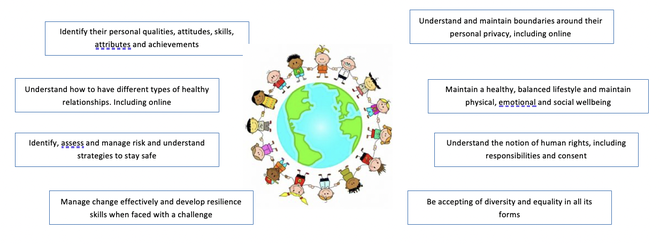PSHE (inc. RSE) Curriculum at Westgate
PSHE Curriculum Intent
Our aim is to equip children to live healthy, safe, productive, capable, responsible and balanced lives. It contributes to personal development by helping pupils to build confidence, resilience and self-esteem, and to identify and manage risk, make informed choice and understand what influences their decisions. It enables them to recognise, accept and shape their identities, to understand and accommodate difference and change, to manage emotions and to communicate constructively in a variety of settings. To develop an understanding of themselves, empathy and the ability to work with others, will help pupils to form and maintain good relationships, develop the essential skills for their futures and better enjoy and manage their lives.
By the end of Key Stage 2, a Westgate Citizen will be able to...

Curriculum Content Coverage
The National Curriculum states that, ‘all schools should make provision for personal, social, health and economic education (PSHE), drawing on good practice'. Our PSHE education contributes to our school’s statutory duties, outlined in the Education Act 2002 and the Academies Act 2010 to provide a balanced and broadly-based curriculum.
|
Core Theme 1: Health and Wellbeing |
Core Theme 2: Relationships |
Core Theme 3: Living in the Wider World |
|
Healthy Lifestyles Keeping Safe Growing and Changing |
Healthy Relationships Feelings and Emotions Valuing Difference |
Rights and Responsibilities Taking Care of the Environment Money |
In the PSHE Curriculum, there are three core themes and within that, different topic areas:
The curriculum frameworks, which have the specific learning objectives, relate directly to the learning opportunities in the PSHE Association’s Programme of Study.
Overarching concepts developed through the Programme of Study
- Identity – their personal qualities, attitudes, skills, attributes and achievements and what influences these; understanding and maintaining boundaries around their personal privacy, including online.
- Relationships – including different types and in different settings, including online.
- A healthy, balanced lifestyle – including physically, emotionally and socially and within relationships, work-life, exercise and rest, spending and saving and lifestyle choices.
- Risk and safety – identification, assessment and how to manage risk, rather than simply the avoidance of risk for self and others, also behaviour and strategies to employ in different settings, including online in an increasingly connected world.
- Diversity and equality – in all its forms, with due regard to the protected characteristics set out in the Equality Act 2010.
- Rights, responsibilities and consent – including the notice of universal human rights, fairness and justice in different contexts.
- Change and resilience – being something to be managed and learning the skills, strategies and ‘inner resources’ we can draw on when faced with challenging change or circumstance.
- Power – how it is used and encountered in a variety of contexts including online; how it manifests through behaviours including bullying, persuasion, coercion and how it can be challenged or managed through negotiation and ‘win-win’ outcomes.
- Career – including enterprise, employability and economic understanding.
Curriculum Drivers
|
COMMUNICATION |
Communication drives the PSHE curriculum by:
|
|
LOCAL |
Local drives the PSHE curriculum by:
|
|
ENRICHED |
Enriched drives the PSHE curriculum by:
|
|
AMBITIOUS |
Ambitious drives the PSHE curriculum by:
|
|
REMEMBERED |
Remembered drives the PSHE curriculum by:
|
Vocabulary
|
|
YEAR 3 |
YEAR 4 |
YEAR 5 |
YEAR 6 |
|
Health and Wellbeing |
emergency aid help safety rules advice support asking for help balance lifestyles choices health wellbeing balanced diet food influences conflicting emotions change transitions loss separation divorce bereavement achievements aspirations goals strengths target-setting |
conflicting emotions feelings managing feelings risk danger hazard responsibility safety pressure managing pressure influences media peer achievements aspirations goals strengths target-setting |
media images reality/fantasy true/false balanced lifestyle choices health wellbeing habits drugs alcohol tobacco medicines caffeine advice support asking for help safety online personal information passwords images mobile phones responsibility safe use emotions feelings managing bacteria viruses hygiene routines puberty physical emotional changes human reproduction babies sexual intercourse pregnancy parents/carers |
puberty physical emotional changes human reproduction babies sexual intercourse pregnancy parents/carers balanced lifestyle choices health wellbeing drugs alcohol tobacco medicines caffeine advice support asking for help risk danger hazard responsibility safety pressure managing pressure influences media peer safety online personal information passwords images
|
|
Relationships |
physical contact touch acceptable unacceptable confidentiality secrets surprises personal safety bullying discrimination aggressive behaviour actions behaviour consequences collaborative working shared goals stereotypes |
stereotypes friendships families couples positive relationships actions behaviour consequences feelings empathy recognising others’ feelings |
people equality identity stereotypes discrimination actions behaviours consequences bullying discrimination aggression privacy sharing personal boundaries |
friendships families couple positive relationship relationships unhealthy pressure actions behaviour consequences dares challenges
|
|
Living in the Wider World |
rights duties home school environment resolving difference points of view decisions choices |
people difference diversity identity UK places values customs money spending saving budgeting enterprise enterprise skills entrepreneurs |
communities volunteers pressure groups health wellbeing people places values customs money spending saving budgeting media social media information forwarding |
laws making and changing rules human rights children’s rights money spending saving budgeting interest loan tax debt resources sustainability economics choices environment anti-social aggression bullying discrimination |
Implementation
At Westgate, PSHE should be taught weekly as a standalone lesson, for at least 30 minutes to ensure there is enough discussion time and to complete a related activity. Some of the units can be integrated within other subjects, but teachers must ensure the PSHE objectives are being met, alongside the cross-curricular subject.
Each year group has 6 units (with the exception of Year 6), to cover throughout the academic year. The amount of lessons needed for each unit, and when each unit will be taught, is the decision of each year group.
|
Year 3 |
Year 4 |
Year 5 |
Year 6 |
|
What are the rules that keep us safe? |
What is diversity? |
What makes a community? |
What makes a healthy and happy relationship? |
|
What can we do about bullying? |
How can we be a good friend? |
What does discrimination mean? |
What are human rights? |
|
How can we have a balanced lifestyle? |
How do we control our feelings and emotions? |
How can we manage money? |
How can money affect us? |
|
What are we responsible for? |
How can we keep safe in our local area? |
How can we help our health? |
How can we stay healthy? |
|
How can we describe our feelings? |
What can we do with money? |
How can we be safe online and using social media? |
How can we manage risk? |
|
What goals do we have for the future? |
What makes us enterprising? |
How do we grow and change? |
Delivering a unit Guidance
- Share what PSHE Education stands for (Personal, Social, Health and Economic Education). Talk to the children about what these four elements mean.
- Talk about the ground rules for a PSHE lesson. In the first lesson of the academic year, the teacher should create a set of ground rules with the class. This could then be printed and shared in the classroom or save as a slide to then share at the start of each PSHE lesson. In the PSHE folder there are examples of ground rules to get ideas from.
- The question for the unit should then be shared with the class. Discuss how it links to PSHE, which elements do they think the question falls under.
- Talk about previous knowledge and vocabulary that they may have used from different year groups. Use the ‘Opportunities to revisit’ grid as guidance.
- Complete a baseline assessment to understand their current knowledge.
- Deliver a series lessons to cover the relevant objectives for the unit.
- At the end of a unit, there should be another assessment completed.
Cross-curricular Links
PSHE can be recorded within cross-curricular links (for example, in science books) or as independent pieces of work. There are also opportunities for PSHE to be discussed in other subjects, such as during computing. If there is the opportunity for a link to be made, the use of the following symbol on slides, in books or on displays would be appropriate:
Local Links
The PSHE curriculum encourages children to consider their role in the local community, and teaches them how to effectively support their local community, through the choices they make.
Opportunities to revisit learning
In our PSHE curriculum we use a spiral approach, which gradually revisits and reintroduces topics at a deeper and more complex level at each year group.
|
Year 3 |
Year 4 |
Year 5 |
Year 6 |
|
What are the rules that keep us safe? |
How can we keep safe in our local area? |
How can we be safe online and using social media? |
How can we manage risk? |
|
What can we do about bullying? |
What is diversity? |
What does discrimination mean? |
What are human rights? |
|
How can we have a balanced lifestyle? |
|
How can we help our health? |
How can we stay healthy? |
|
What are we responsible for? |
|
What makes a community? |
|
|
How can we describe our feelings? |
How do we control our feelings and emotions? |
How do we grow and change? |
|
|
What goals do we have for the future? |
What makes us enterprising? |
|
|
|
|
How can we be a good friend? |
|
What makes a healthy and happy relationship? |
|
|
What can we do with money? |
How can we manage money? |
How can money affect us? |
Impact
The model of assessment that is most meaningful in PSHE education is ipsative assessment. Ipsative assessment compares where a pupil is at the end of a lesson or unit, against there they were before. So the benchmark against which progress is measured is the pupil’s own starting point, not the performance of others. This gives us the following model for assessing any learning in PSHE education:

A bank of baseline assessments, assessment for learning and assessment of learning activities are shared with the teachers, and they choose which are most appropriate for the units they are teaching.
SMSC
|
SPIRITUAL |
The spiritual development of pupils is shown by their:
|
|
MORAL |
The moral development of pupils is shown by their:
|
|
SOCIAL |
The social development of pupils is shown by their:
|
|
CULTURAL |
The cultural development of pupils is shown by their:
|
|
BRITISH VALUES |
Showing an understanding of individual liberty by being able to express their opinions through discussions and activities. Developing mutual respect for others’ opinions and beliefs. Understanding of right and wrong (rule of law) through discussions and explicit teaching. Showing a tolerance of those with other faiths and beliefs through discussions and explicit teaching. |
